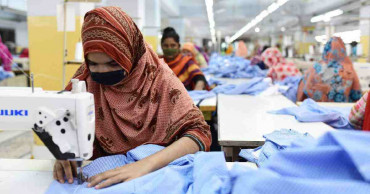Nikkei Asia
Dangling threat of visa sanctions in Bangladesh’s case, US silent on undeclared martial law situation in Pakistan: Geostrategist Chellaney
US Secretary of State Antony Blinken's announcement to withhold visas from individuals "responsible for, or complicit in, undermining the democratic election process" in Bangladesh is hardly conducive to the promotion of this aim, says Professor Emeritus of Strategic Studies at the Center for Policy Research in New Delhi, Brahma Chellaney.
"If anything, it is likely to prove counterproductive," he wrote in an article published by Nikkei Asia on Monday.
Also read: New US visa policy declared targeting next Bangladesh polls
Chellaney is a former adviser to India's National Security Council, and has authored nine books, including "Water: Asia's New Battleground".
US President Joe Biden’s administration “has made Bangladesh a focus of its democracy promotion efforts by dangling the threat of visa sanctions against officials who undermine free elections while staying silent on the undeclared martial law situation in Pakistan, where mass arrests, disappearances and torture have become political weapons,” writes the professor.
Also read: US govt’s new visa policy does not bother Bangladesh government: Shahriar Alam
"The short answer is that US promotion of democratic rights has long been selective, with geopolitical considerations often dominant. The pursuit of moral legitimacy for the cause of democracy promotion has also contributed to making sanctions the tool of choice for US policymakers," Prof Chellaney says.
In the case of Bangladesh, he thinks, the Biden administration is seeking to leverage two other factors: that close relatives of many Bangladeshi politicians live in the US or Britain, including Prime Minister Sheikh Hasina's son who holds an American green card; and that the bulk of Bangladesh's exports go to the West, with the US being the top destination.
Also read: Bangladesh expects new US visa policy will not be applied arbitrarily in non-objective manner
"In fact, bullying the world's seventh-most populous country, far from helping to promote a free and fair election, is more likely to revive painful memories of how the US looked the other way in 1971 as the Pakistani military brutally resisted Bangladesh's efforts to achieve independence from Islamabad, slaughtering up to 3 million people. What is Washington really after now?" — the professor questions.
Bangladesh's impressive growth trajectory stands in stark contrast to the chronic political and economic turmoil seen in Pakistan, which today is teetering on the brink of default. Yet while Bangladesh was excluded from the Summits for Democracy convened in 2021 and earlier this year by Biden, Pakistan was invited both times though it did not attend either, the article reads.
Also read: US eyeing enhanced cooperation with Bangladesh in security and trade
While continuing to reward Pakistan by prioritizing short-term geopolitical considerations, the Biden administration has been criticizing democratic backsliding in Bangladesh.
Blinken's wielding of the “visa-sanctions stick” is clearly aimed at members of PM Hasina's government, including law enforcement and other security officials, although the announcement of the new policy also mentioned members of opposition parties, Prof Chellaney writes.
Also read: US consistent on the need for free, fair election in Bangladesh: White House
"But sanctioning foreign officials usually serves no more than a symbolic purpose while hampering diplomacy. It can also have unintended consequences," he adds.
The professor observed that the new hardline towards Dhaka makes little sense. "The Hasina government could be a significant partner in the US war on terror and in improving Asian security. Instead, bilateral relations are under strain. No one from the Biden administration even met with Hasina when she visited Washington last month for discussions with the World Bank and International Monetary Fund."
"While in Singapore this month, (US Defense Secretary Lloyd) Austin declared that America ‘will not flinch in the face of bullying or coercion’ from China. But bullying and coercion are also unlikely to advance US interests in Bangladesh," the article reads.
Also read: Exaggeration, inconsistency in Congressmen’s letter: Shahriar Alam
2 years ago
Dhaka trashes NIKKEI Asia report as “completely false, misleading”
Bangladesh has described the recent report run by NIKKEI Asia as “completely false and misleading” saying Bangladesh will share its reaction with NIKKEI Asia on the report.
“This is not true. It’s completely false and misleading,” State Minister for Foreign Affairs Md Shahriar Alam told reporters on Monday, adding that there is nothing like Bangladesh-China maintenance centre or missile maintenance centre and there is no plan to have anything like that.
But naturally, he said, regular maintenance is required when any equipment is purchased from any country which is part of that particular purchase.
“Beyond this, there is no plan to build any facility afresh. Even in the past, there was no such facility that could be used as a hub,” Shahriar explained further.
NIKKEI Asia recently ran a report titled “India wary of China setting up Bangladesh missile maintenance hub, Beijing 'crossing a line' as it deepens defense ties with old ally of New Delhi."
With China preparing to set up a maintenance facility in Bangladesh for surface-to-air missile systems it supplied in 2011, alarm bells are ringing in New Delhi, the report reads.
READ: BD’s economic growth to accelerate: Hasina tells Nikkei Asian Review
Talking to UNB, a Foreign Ministry official said the report carried by NIKKEI ASIA is a "provocative and leading" one and he sees an "evil motive" behind such a report in the media. "This doesn't appear to be true. If it is not true, should we say so?"
On Sunday, Chinese Ambassador to Bangladesh Li Jiming said China will not build any military base in Bangladesh or any other foreign land.
“China will not build any military facility or military base on any foreign territory, including in Bangladesh. China will not build anything militarily in any other country’s territory. That’s for sure,” he said when his attention was drawn about the report.
Ambassador Jiming, however, said he does not have any specific information about the media report and he will have to check it further. “I cannot firmly confirm this information because this is from the (media) report. I will have to check it. That is so far I can share with you.”
3 years ago
Bangladesh's growth, govt efforts during pandemic praised
Nikkei Asia, in its recent article, praised Bangladesh's growth describing how the economy has boomed and exports soared.
The article also described how Bangladesh's economy has even exhibited resilience during the coronavirus pandemic and appreciated the government's timely stimulus packages and decision to reopen factories as early as May 2020.
The article titled "Bangladesh at 50: how the country has fared since independence" mentioned that since 1971, it has outstripped Pakistan in generating growth, with apparel exports and a surge in remittances helping to drive the economy.
Bangladesh marked the 50th anniversary of its independence from Pakistan "buoyed by economic progress and a relatively successful response to the coronavirus pandemic."
Also read: UK PM hails Bangladesh’s growth
But, the article suggested that the progress still needed to lift more of its 163 million people, 2% of the global population, out of poverty and highlighted challenges and concerns.
Bangladesh's growth rate exceeded 8% in 2019, according to World Bank data.
When the country seceded from Pakistan, its gross domestic product per capita was about three-quarters of Pakistan's; by 2019, it was almost 45% more.
4 years ago




